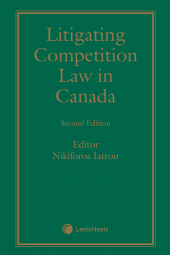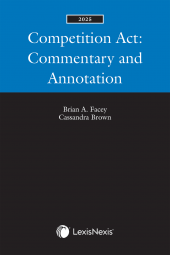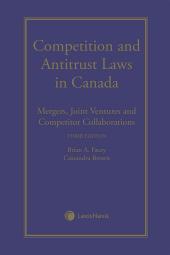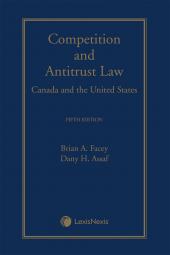Litigating Competition Law in Canada, 2nd Edition
One Year Subscription Only Terms
Subscribers receive the product(s) listed on the Order Form and any Updates made available during the annual subscription period. Shipping and handling fees are not included in the annual price.
Subscribers are advised of the number of Updates that were made to the particular publication the prior year. The number of Updates may vary due to developments in the law and other publishing issues, but subscribers may use this as a rough estimate of future shipments. Subscribers may call Customer Support at 800-833-9844 for additional information.
Subscribers may cancel this subscription by: calling Customer Support at 800-833-9844; emailing customer.support@lexisnexis.com; or returning the invoice marked 'CANCEL'.
If subscribers cancel within 30 days after the product is ordered or received and return the product at their expense, then they will receive a full credit of the price for the annual subscription.
If subscribers cancel between 31 and 60 days after the invoice date and return the product at their expense, then they will receive a 5/6th credit of the price for the annual subscription. No credit will be given for cancellations more than 60 days after the invoice date. To receive any credit, subscriber must return all product(s) shipped during the year at their expense within the applicable cancellation period listed above.
Product description
The number of competition law cases adjudicated in Canadian courts and before the Competition Tribunal continues to grow, and that growth has prompted an increased need for guidance from experienced practitioners. While there are ample resources that offer summaries of substantive rulings, Litigating Competition Law in Canada, 2nd Edition brings together some of the Canada's most successful and knowledgeable competition lawyers to offer practical advice on how to most effectively bring or defend competition law cases.
The first of its kind, this comprehensive guide to litigating competition matters in Canada contains the information and practical guidance that private practitioners and in-house counsel need to understand when dealing with a contentious competition law case. Litigating Competition Law in Canada, 2nd Edition features contributions from Canada's leading competition litigators. They provide strategic insight into the procedural aspects of litigating a competition matter and offer examples of tactical steps counsel can take to advance their clients' positions.
Features of This Book
- Provides an overview of the different players in competition litigation as well as the range of investigations and proceedings that can be brought by those players
- Outlines the various constitutional issues that can arise in relation to the Canadian Charter of Rights and Freedoms and the Canadian Bill of Rights and foreshadows the constitutional battles to come
- Explains the requirements and procedures that relate to the Commissioner's powers of investigation to gather evidence, compel testimony and conduct searches and seizures. It also outlines the guidelines, restrictions and safeguards that are designed to ensure that these investigative powers are used in a reasonable and effective manner
- Offers a guide to litigating competition class actions by explaining the relevant background and statutory framework, including who can be a plaintiff, what claims plaintiffs can bring, what plaintiffs have to prove, and what limitation periods apply. Provides detailed insight on how to settle competition class actions and the issues that arise in those negotiations
- Describes private actions before the Tribunal, including the legislative scheme, procedures, applicable tests and evidentiary standards. Provides a comprehensive overview of all cases decided under the private action sections of the legislation, dividing them between cases where leave was granted and cases where it was refused. The requirements, authority and tests for seeking injunctive relief are also outlined
- Includes a chapter devoted to expert evidence that explains how to choose and retain an expert, and how to deploy their expertise in Bureau advocacy, Tribunal cases and private actions before the courts
- Addresses the procedural aspects of litigating cases against the Competition Bureau before the Competition Tribunal, including reviewing the types of cases the Tribunal can hear, the procedural steps prior to a hearing and at the hearing itself, evidentiary issues and remedies, as well as the availability of mediation before the Tribunal and examples of motions that might be brought before the Tribunal
- Discusses the criminal offences in the Competition Act and provides a comprehensive and robust overview of the Act's criminal provisions, related jurisprudence and litigation practice, as well as a detailed description of the immunity and leniency programs and guilty plea process
What’s New In This Edition
- New chapter on international coordination of cases, addressing the international aspects of competition law, mostly through the lens of international mergers and international cartels/class actions
- New chapter on e-discovery in Competition Act investigations, discussing the best practices in respect of discovery obligations, including how to respond to Competition Bureau Supplementary Information Requests and “Section 11 Orders”
- Updated case law since the previous edition published in 2018, including new Competition Bureau cases before the Competition Tribunal
- Discussion of the recent amendments to the Competition Act on the right of private action
- Updated guidance on class actions in competition law
- Updated content on criminal offences and prosecutions under the Competition Act and investigatory orders
Who Should Read This Book
- Corporate/commercial and competition lawyers who need to navigate the complex area of competition litigation so they can advise clients embroiled in a contentious matter
- In-house lawyers who want to understand the finer points of competition litigation so they can effectively guide the company through contentious matters
- Competition Bureau, Commissioner of Competition and Competition Tribunal lawyers and experts who must have a sound understanding of competition litigation
- Judges who hear competition matters at the provincial or federal level and are less familiar with this area of the law
- Businesses and trade associations that will benefit from an overview of competition law
- Law libraries that want to provide a valuable resource for their patrons including the large number of law schools that participate in Competition Law Moots
- International corporate/commercial and competition lawyers who are dealing with competition litigation with international aspects
- Academics who research and write on questions of competition/antitrust law
Contributors
Donald Houston & Erich Schultze
Linda Plumpton & James Gotowiec
W. David Rankin
Randal Hughes, Emrys Davis & Kolding Larson
Danielle Royal & David Feldman
Katherine L. Kay & Mark Walli
Scott McGrath & Erin Keogh
Randall Hofley, Kate McNeece & Joseph Osborne
Neil Campbell & Samantha Gordon
Susan Wortzman, Lauren Fishman & Gideon Kwinter
Table of contents
Foreword
Chapter 1: Overview of Competition Litigation – Players and Proceedings
Chapter 2: Competition Bureau Cases Before the Competition Tribunal
Chapter 3: Constitutional Issues in Competition Litigation
Chapter 4: Criminal Offences and Prosecutions Under the Competition Act
Chapter 5: Investigatory Orders
Chapter 6: Competition Law Class Actions
Chapter 7: Private Actions Before the Tribunal
Chapter 8: Expert Evidence
Chapter 9: International Coordination of Cases
Chapter 10: E-Discovery in Competition Act Investigations
Table of Cases
Index
 Lexis Nexis
Lexis Nexis 


